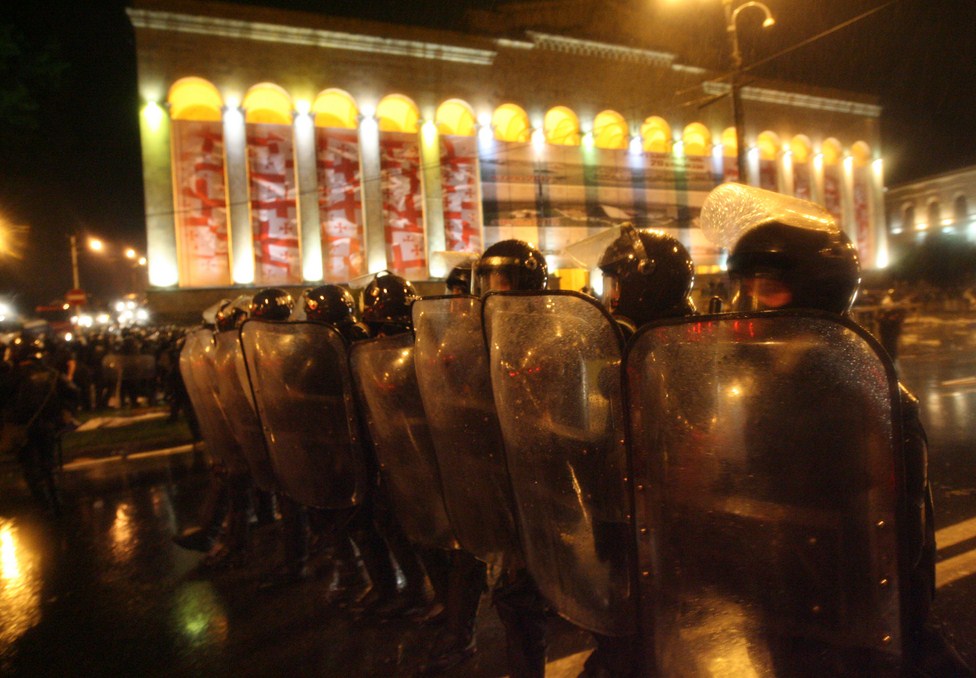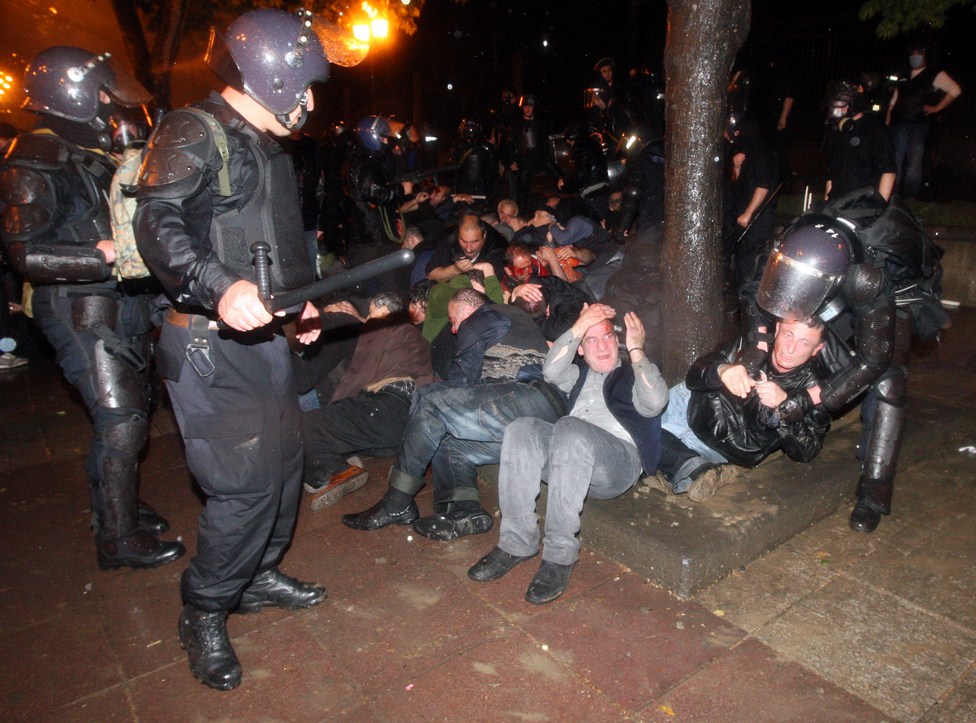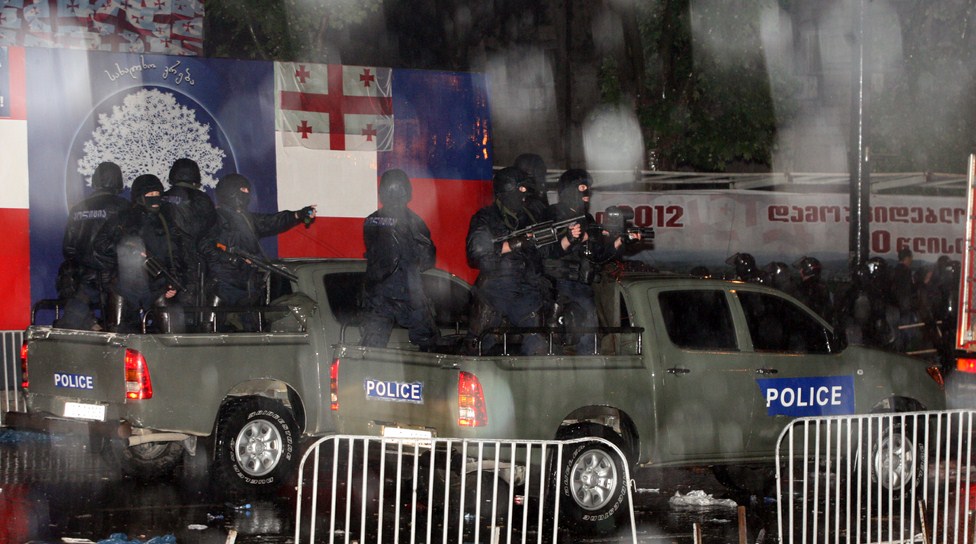According to the local media, police used disproportionate force and beat the detained demonstrators who showed no resistance. In addition to that, the journalists were hindered to perform their professional activity; several were injured and detained.
 The representatives of Georgia’s Public Defender monitored the dispersal of the rally and visited the detained demonstrators. The Public Defender made a preliminary assessment of the dispersal. He stated that the international standards and Georgian legislation have been violated, resulting in the violations of the rights of certain citizens:
The representatives of Georgia’s Public Defender monitored the dispersal of the rally and visited the detained demonstrators. The Public Defender made a preliminary assessment of the dispersal. He stated that the international standards and Georgian legislation have been violated, resulting in the violations of the rights of certain citizens:
“I would like to note that even though there was a lawful authority to break up the protest rally, the police used disproportionate force. The protest rally participants were not given a chance to leave the rally peacefully. Many of them have been physically assaulted by the law-enforcement officials. According to the received information, the law-enforcement officials damaged the equipments of the journalists and verbally and physically assaulted them.”
As Public Defender stated at the briefing, he had addressed the Main Office of Prosecutor with a recommendation to launch immediate and effective investigation into the abovementioned facts.
“Even if the Tbilisi demonstration was unauthorized, nothing can justify the beating of largely peaceful demonstrators. Police responsible for beating protesters should be held accountable,” – stated Rachel Denber, Europe and Central Asia Deputy Director at Human Rights Watch.
“On May 25, 2011, hundreds of opposition supporters gathered in front of the Parliament building on Rustaveli Avenue, the main thoroughfare in Tbilisi. The authorities warned protesters that they would break up the demonstration in order to make way for the planned Independence Day military parade on Rustaveli Avenue on May 26.
The protesters had a permit to hold a rally on May 25 that expired at midnight, and opposition leaders stated that they intended to stay put. Tbilisi’s municipal authorities offered the protesters another rally venue, which they refused. At 12:15 a.m., 15 minutes after the rally permit expired, riot police moved on the demonstrators using water cannons and teargas to disperse them, beating and detaining many. In one case, they chased down demonstrators who had taken shelter in a nearby cinema,” – reads the statement of Human Rights Watch disseminated today.
after the rally permit expired, riot police moved on the demonstrators using water cannons and teargas to disperse them, beating and detaining many. In one case, they chased down demonstrators who had taken shelter in a nearby cinema,” – reads the statement of Human Rights Watch disseminated today.
Georgian NGOs also note on the excessive use of force against the demonstrators. Human Rights Center (HRIDC) has been monitoring the demonstrations in the framework of OSCE supported project. According to the project coordinator Beka Jikia, the monitors have been daily monitoring the actions providing unbiased information on the upheavals.
“Though the action was unauthorized and certain part of the demonstrators was preparing to oppose the police force, the monitoring revealed that the special police units evidently used excessive force and violated the law. Specifically, the police made a siege around the demonstrators from all different sides. They occupied all streets which could have been used to leave the territory. This means that the goal of the operation was not dispersal of the action (compelling the demonstrators to leave the territory) but the maximum physical vengeance. After making a siege, the police made no verbal warning about the dispersal, like it happened in November of 2007. The police units made a direct attack and fired from special gas bomb shells.
While inspecting the territory after the dispersal of the protest rally it was observed that in front of the Tavisupleba Metro Station, approximately 10 people had been forced on the ground and physically and verbally assaulted.
Considering all the abovementioned, even though the demonstrators had violated the legislation, the police used excessive force and violated the law.”
Georgian Young Lawyers Association and Transparency International Georgia disseminated a statement noting the use of excessive force and the signs of crimes of police: “Even if the decision about dispersing the rally was legitimate, the scenes disseminated by the media evidently demonstrate the signs of excessive use of force by the police that represents a grave violation of Law on Police.”
Accordin g to the organization Article 42 of the Constitution, dispersal of protest rally by the MIA forces on May 26 did not comply with the Georgian legislation and the standards established by the international norms. The organization addresses General Inspection of MIA and the Office of General Prosecutor of Georgia to launch effective investigation in order to raise responsibility of concrete individuals regarding the protest rally of May 26, 2011.
g to the organization Article 42 of the Constitution, dispersal of protest rally by the MIA forces on May 26 did not comply with the Georgian legislation and the standards established by the international norms. The organization addresses General Inspection of MIA and the Office of General Prosecutor of Georgia to launch effective investigation in order to raise responsibility of concrete individuals regarding the protest rally of May 26, 2011.
To remind, on May 21 approximately 25 thousand people were gathered in Tbilisi by the leading of Public Assembly. The demonstrators requested the resignation of the President Saakashvili. Protest demonstrations were held in the regions of Georgia as well. The demonstrators and law-enforcement officials clashed in Batumi.
The protest action which initially started at the Freedom Square transferred to the front of the building of Public Broadcaster with the request of live broadcasting of the action. The demonstrators gave 15 minutes to the leadership to decide on their request. Public Broadcaster satisfied their request and provided 5-5 minute live covering of the action. However, the leaders of Public Assembly did not find it sufficient.
Human Rights Center has been monitoring the protest rallies and expressed concern over the facts of detainment of citizens on the way to Tbilisi and deprivation of their cars: “On May 21st, the Special Forces dispersed the protest rallies in front of the building of Public Broadcaster by means of clubs and rubber bullets after the demonstrators damaged the car of police officials by plastic sticks. The incident occurred when the representatives of law-enforcement tried to kidnap one of the demonstrators compelling him to sit in the car. According to the protest rally participants, these people were not wearing police uniform and did not present any identification card. Neither the black car had some kind of indication that it belonged to the police,” – reads the statement of the Human Rights Center.
According to the official information of MIA of Georgia, on May 22nd, at 7:00 pm, the drunken demonstrators attacked the police car and the policemen in front of the building of Public Broadcaster.
Georgian Party which had announced earlier to hold another protest rally on May 25th with the request of the President’s resignation joined the Public Assembly on May 22nd. The information was disseminated that one of the leaders of Georgian Party and a former Defense Minister Irakli Okruashvili was planning to arrive in Tbilisi. Later he changed his mind and didn’t arrive. It should be noted that Okruashvili was charged with abuse of authority and money extortion in 2007. Later he found political asylum in France.
“For several days lately, it has been restricte d to leave Akhalgori region both for cars and pedestrians. The checkpoint has been closed by Georgian side and as Akhalgori residents state the reason is Okruashvili. The government is scared that ex-Minister will enter from Russia through Tskhinvali that is a really shameful fact. It turns out that the government is more concerned by the fate of Okruashvili than its citizens and their free transportation,” – stated conflict scientist Paata Zakareishvili.
d to leave Akhalgori region both for cars and pedestrians. The checkpoint has been closed by Georgian side and as Akhalgori residents state the reason is Okruashvili. The government is scared that ex-Minister will enter from Russia through Tskhinvali that is a really shameful fact. It turns out that the government is more concerned by the fate of Okruashvili than its citizens and their free transportation,” – stated conflict scientist Paata Zakareishvili.
The fact of closure of border was confirmed by the Akhalgori residents who spoke with Human Rights House and expressed doubt that this fact is related to the ongoing demonstrations in Tbilisi.
The demonstrations with the request of President’s resignation started on April 9th of 2009 and lasted for several months, however, with no result. In the process of the upheavals the law-enforcement officials used non-lethal weapon, namely the plastic and rubber bullets against the demonstrators. Georgian legislation did not allow the usage of such weapons at that time; however the changes were made to the Law on Police later according to which the non-lethal weapon was added to the list of special means of police. The corresonding change was made after the November 7 of 2007 when the law-enforcement officials used force against the peaceful demonstrators. First time in Georgian history, the special means water canons and rubber bullets, the device of psychological pressure were used. European Union, Council of Europe, Organization for Security and Cooperation in Europe, North Atlantic Alliance – this is the list of international organizations who strictly assessed the disperse of November 7 protest rally.
HRHN letters of concern:


